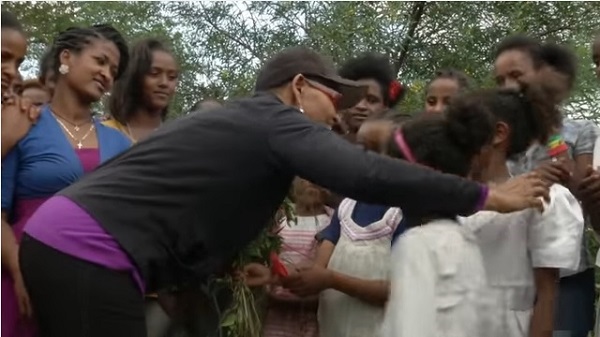
A local NGO, Kembatti Mentti-Gezimma (KMG Ethiopia), raises awareness about the harms of female genital mutilation (FGM), encouraging community members to mobilize against the practice.
DURAME, Ethiopia (UNFPA)– Genet Girma, 31, was a trailblazer in her community. Fifteen years ago, she ran away from home when she learned that her mother planned to have her undergo female genital mutilation (FGM).
As in many other communities in Ethiopia, FGM is deep-rooted in the Kembatta community, which Ms. Genet belongs to. The practice can cause lasting harm, including pain, infection, haemorrhage and complications in childbirth. It can even be fatal.
But Ms. Genet had learned about these consequences from local activists, and refused to undergo the procedure.
Fortunately, after leaving home, she ran into her fiancé. He told her he would support her. In fact, he said that he would only marry her if she were spared FGM.
“If I didn’t have support, especially from my partner, things would have gone wrong,” she recalled.
Changing minds: KMG Ethiopia
A local NGO, Kembatti Mentti-Gezimma (KMG Ethiopia), began working in the community around the same time Ms. Genet’s mother arranged the cutting.
KMG raises awareness about the harms of FGM, encouraging community members to mobilize against the practice. Since then, influential members of the community, youth advocates, empowered girls and others have come together to change attitudes about FGM. Information about FGM is also broadcast through local media.
Ms. Genet later married her fiancé – without being cut. Their families were initially unsupportive.
“No member of our families, from both sides, attended our wedding,” she recalled.
ALSO: Bogaletch Gebre: Almost All Girls Were Cut in Her Ethiopian Village. Not Anymore, Thanks to Her.
After the wedding, KMG Ethiopia visited the families to explain the consequences of FGM. Their parents eventually accepted Ms. Genet’s decision.
And other young couples in the community began to follow their lead.
“After my marriage, most of my friends got married to girls that are not circumcised,” Addise Abose, Ms. Genet’s husband, said. “I am happy that I have become an example.”
Celebrating being whole
Some 65 per cent of Ethiopian women, aged 15-49, have been subjected to FGM, according to a 2016 survey.
In the Kembatta community, the practice is traditionally considered a rite of passage into adulthood.
Read the complete story at UNFPA
